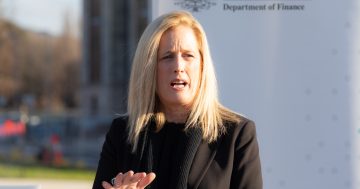
Government procurement is getting a makeover to offer more opportunities for SMEs. Photo: File.
Small and medium enterprises are the winners from the Federal Government’s incoming changes to Commonwealth Procurement Rules, with new targets set to award more contracts to SMEs that contribute to the Australian economy.
From July, higher targets will be introduced to source 25 per cent of procurements below $1 billion and 40 per cent below $20 million from SMEs.
In addition, government entities will find it easier to procure from small and medium businesses by raising the SME exemption threshold to $500,000.
While these are just targets, the government will require at least one SME to be approached for every request for quote from the mandated Management Advisory Services (MAS) Panel and the People Panel.
Finance and Public Service Minister Katy Gallagher said the changes are being implemented in response to feedback about the operation of government procurement panels.
Noting that Commonwealth procurement is a significant economic lever, the minister said the new targets would provide more opportunities for small and medium businesses operating in Australia.
“The Albanese Government has listened to industry and small and medium businesses and is taking action to improve their participation and competitiveness in government procurement,” she said.
“When used effectively, government procurement supports Australian businesses and can stimulate growth in small and regional businesses and across industry sectors.”
Further enhancing the opportunities for First Nations businesses through a new Flexibility Allowance, 5 per cent of agencies’ spending on services through the MAS and People Panels can now be sourced directly to First Nations businesses, not on those panels.
The government is also reducing the threshold for procurements that require an economic benefit assessment from $4 million to $1 million, meaning more procurements will be subject to an assessment of the benefit to the Australian economy in the context of determining value for money.
This will be supported by comprehensive new guidance to help officials effectively undertake economic benefit assessments that the Department of Finance is currently consulting on.
In the wake of the PwC breach of trust scandal and the growing calls for greater scrutiny of consultancy services to the Australian Public Service – as well as numerous audit reports exposing ethics to be lacking in procurement processes across several agencies – the government wants to be seen to be changing the rules.
The minister said the Federal Government is committed to the highest standards of ethics, probity and integrity and seeks to work with businesses that strive for the same high standards.
The Commonwealth Supplier Code of Conduct will be a core component of the Commonwealth Procurement Rules, explaining the government’s minimum expectations of suppliers and their personnel while under contract with the Commonwealth.
The code outlines a range of expectations regarding suppliers’ ethical behaviour, governance and business practices and welfare of employees.
Small Business Minister Julie Collins said Australia’s SMEs are eager to make the most of government procurement opportunities.
“The changes we are introducing from 1 July will help to ensure Australia’s small businesses get a bigger slice of government procurement opportunities,” she said.
“This is just one way our government is delivering a better deal for small businesses, with more than $640 million in targeted support outlined in our Budget’s Small Business Statement.”
The Senate’s cross-party Finance and Public Administration References Committee delivered its final report last week into the integrity of consultancy services to the APS.
The report called for significant changes to how consultants are contracted.
Its report recommends that the Department of Finance update its contract management guide to require that Australian Government contracts include a clause stating that service providers have a duty to act in the public interest when delivering work for the government.
The updated Commonwealth Procurement Rules will come into effect on 1 July 2024.
Original Article published by Chris Johnson on Riotact.










